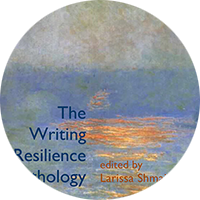Medusa's Country by Larissa Shmailo06/27/17Medusa peels herself from the pages of mythology to become a denizen of New York City’s margins. There, she waltzes with Thanatos: “The dance with death? / Ah,
this: as I flirt, you draw near.” When Eros shows up, he lures Medusa on a peregrination toward a broken self: “My naked heart unrobes, undressed of anguished cries.”Shmailo adds, “Larissa’s rose is sick and is consuming me.” This alludes to William Blake’s poem “The Sick Rose,” pertaining to self-destructive sexuality. While beautiful, the rose has become infected by a worm. Addressing herself in an epistolary moment, Shmailo states, “Dear Friend of ferment / who unearths worms // that enrich this blissful human soil.”Here lies one of many moments of transformation. The poet, though brutally honest about her bouts with mental illness, mania, and deleterious behaviors, also acknowledges the alchemy available by casting pain into language. Purged, the expectation for starting anew enriches this “human soil,” fecund with possibility and, surprisingly, hope. Here is one of the many strengths of this collection of poems—it is relentlessly honest and (therefore) resilient.These qualities guide the poet’s exploration. Along the way, the gorgon assumes other personae, including a prostitute named Nora, a reluctant villain, not unlike Medusa herself. Once, one of Athena’s priestesses, she was raped by Poseidon. Instead of being seen as the victim, Medusa was held responsible by Athena, who turned the gorgon’s curls into snakes (Blake’s worm?) and made all who gazed upon her turn to stone. Medusa was ostracized by her own power. Shmailo avers, “His eyes transfixed by my serpents / that hardened, froze, and pleased.” Indeed, misogyny has—from antiquity to Ibsen’s era to the present—castigated women who dared to exhibit intelligence and power. Many of these poems lead the reader through histories of misogyny and sexual abuse (as in the myth itself). In a poem titled “Rapes,” Shmailo confesses:I abandoned myself to invisible hands,
the known vice and the strong vise of my nerves and my glands.
I half-screwed and cat-moaned and imagined your stare
in the stranger, his knife slowly teasing my hair.She unpacks her poet’s suitcase of prosody and nuanced rhymes, knowing that a poem is not only about a given topic, but also about the agency of language itself. Like a stab, she writes, “The rapist called me fat.” Again, the victim, not the perpetrator, is rebuked. Nonetheless, these poems ultimately serve a triumphant voice—a brave and audacious “I.” Convinced of her prowess,
this Medusa stares into her own mirror, where she confronts distorted notions of normalcy: “You, my reflection, in pain,” and, “We live in parts.”Despite landing on a psychiatric ward, she frees herself with sardonic wit and blade-sharp language: “Bellevue, Bellevue, where nurses’ crazy laughter / rings through the night.” The writing is so visceral, the reader feels trapped in the “locked ward,” along with the author. One can hear the howls and smell the disinfectants.However, with verve, with chutzpah, with urgency, Shmailo’s poems become spells, freeing her, transforming stone into flesh:I spent my whole life seeking it,
wrecking, reeking, eking it,
in hydra-headed phalluses;
in aliases & pal-louses;
in papapapapaMedusas;
in mirrors & seducers.Ultimately, she magicks death into an affirmation of life: “I love love’s desert and its snow.” Indeed, she has led us from one extreme terrain to another—and back to the silence of the page, where we marvel at her hard-won wholeness. As we read this book, it becomes our own.
DEAN KOSTOSDean Kostos’s forthcoming poetry collection is
Pierced by Night-Colored Threads. His books include
This Is Not a Skyscraper (recipient of the Benjamin Saltman Poetry Award, selected by Mark Doty),
Rivering,
Last Supper of the Senses,
The Sentence That Ends with a Comma, and
Celestial Rust. He edited
Mama’s Boy and
Pomegranate Seeds.













